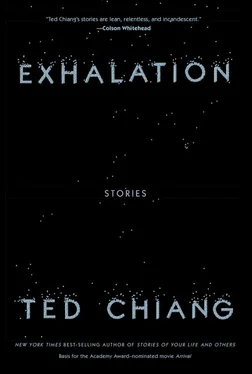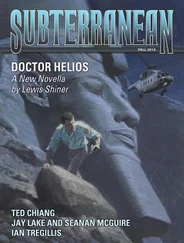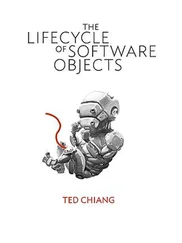Nat was silent for a while—it had been a long time since she’d done anything like this—but the group leader could tell she had more to say and he waited patiently. Eventually she continued, “There are people I’ve hurt that I’ll probably never be able to make amends to. They’ll never give me the chance, and I can’t blame them. But I suppose, at some level, that made me think that if I wasn’t able to do right by them, the ones I’d hurt the most, then it didn’t really matter whether I was nice to other people or not. So I stayed clean, but I would still lie, I would still cheat. Nothing terrible, nothing that hurt anyone the way I did when I was using. I just looked out for myself, and I never really thought much about it.
“But recently I had this…this opportunity to do something actually nice for another person. It wasn’t anyone I had wronged, just someone who was hurting. It would have been easy for me to behave the way I always have. But I imagined what a better person might do, and I did that instead.
“I feel good about what I did, but it’s not like I deserve a medal or anything. Because there are other people for whom being generous comes easily, without a struggle. And it’s easy for them because in the past they made a lot of little decisions to be generous. It was hard for me because I’ve made a lot of little decisions to be selfish in the past. So I’m the reason it’s hard for me to be generous. That’s something I need to fix. Or that I want to fix. I’m not sure if this is the right group for that, but this is the first place I thought of.”
“Thank you,” said the group leader. “You are absolutely welcome to attend these meetings.”
The other new person, a young man who looked like he’d just graduated from high school, introduced himself and started talking. Nat turned to him to listen.
· · ·
There was a package waiting for her when Dana got home. Once she was in her apartment, she opened it and found a personal tablet inside; no retail packaging, just an adhesive note stuck to the screen: “For Dana.” She checked the wrapping, but there was no name or address for the sender.
Dana turned the tablet on; the only icons on the screen were half a dozen video files, each labeled with her name followed by a sequence of numbers. She tapped the first one to watch it, and the screen filled with a low-resolution image of her face. But it wasn’t her, it was a parallel version of her, talking about her past.
“Ms. Archer came into our room and found us counting the pills. She asked us what was going on, and for a second I froze. Then I said they were mine, that Vinessa hadn’t known anything about them. She was suspicious, because I’d never been in trouble before, but I convinced her. Eventually I got suspended from school, but it didn’t turn into as big a deal as it could have; they put me on probation, so if I stayed out of trouble, it wouldn’t go on my permanent record. I knew it would have been much worse for Vinessa because of the way the teachers felt about her.
“But Vinessa started avoiding me, and when I finally asked her why, she told me she felt guilty every time she saw me. I told her she didn’t have to feel guilty and that I wanted to hang out with her, but she said I was just making it worse. I got angry at her; she got angry at me. She started spending time with these other girls who were constantly getting into trouble, and everything went downhill from there. She was caught dealing on school grounds, she was expelled, and she was in and out of jail all the time after that.
“And I keep thinking, if I hadn’t said the pills were mine, everything would be different. If I had let Vinessa take her share of the blame, there wouldn’t have been that wedge to drive us apart. We would have been in it together, she wouldn’t have started hanging out with those troubled girls, and her life would have gone in a completely different direction.”
What the hell? Fingers trembling, she tapped on the second video.
Another Dana: “One of the teachers came into our room just as we were counting the pills. I confessed everything immediately; I told her that Vinessa and I had stolen them from our parents so we could have a party. Eventually the school suspended us and put us on probation; I think they wanted to do something worse to Vinessa, but they had to punish us both equally.
“Vinessa was furious at me. She said I should have told the teacher we just found the pills, that someone must have slipped them into our bag at the airport, and we were about to tell a teacher about them. She said they wouldn’t have been able to pin anything on us. But because I had confessed, she was on probation and the teachers who hated her could take her down at any time. She wasn’t going to give them that power over her. As soon as our suspensions were over, Vinessa came into school drunk. After she did that a few times, the school expelled her, and she started getting arrested.
“And I keep thinking, if only I hadn’t confessed, everything would be different. That close call would have been enough to warn Vinessa away from getting into real trouble. She only started acting out because she was angry at me. If it weren’t for that, she would have gotten into a good college, and her life would have gone in a completely different direction.”
The other videos made no mention about being caught with the pills, but they still followed a recognizable pattern. In one, Dana felt guilty about introducing Vinessa to a boy who got her addicted to drugs. In another, it was a successful shoplifting incident that emboldened Vinessa to attempt more dramatic thefts. All these Vinessas getting stuck in patterns of self-destructive behavior. All these Danas blaming themselves for it, no matter what actions they took.
If the same thing happens in branches where you acted differently, then you aren’t the cause.
She had lied about the pills being Vinessa’s, but her lie wasn’t what pushed Vinessa off the edge, what turned her into a delinquent. That was the direction Vinessa was always going to move in, no matter what anyone else did. And Dana had spent years and thousands of dollars trying to make amends for what she’d done, trying to fix Vinessa’s life. Maybe she didn’t need to do that anymore.
Dana took a look at the metadata on the video files. Each file included information about the prism it had come from; the prisms had activation dates that were fully fifteen years in the past.
Fifteen years was how long it had been since she and Vinessa had gone on that field trip. Data brokers were just getting started then, and the prisms of the time had much-smaller pads than modern ones. She was surprised that any data brokers still had prisms of that vintage, let alone ones with enough data left in their pads to transmit video. Those were the most valuable prisms that data brokers owned, and transmitting these videos had probably exhausted their pads.
Who would have paid for this? It must have cost a fortune.
“THE MERCHANT AND THE ALCHEMIST’S GATE”
Back in the mid-1990s the physicist Kip Thorne was on a book tour, and I heard him give a talk in which he described how you could—in theory—create a time machine that obeyed Einstein’s theory of relativity. I found it absolutely fascinating. Movies and television have encouraged us to think of time machines as vehicles you ride in, or else some kind of teleporter that beams you to different era. But what Thorne described was more like a pair of doors, where anything that goes in or comes out of one door will come out or go into the other door a fixed period of time later. Several questions raised by vehicular or transporter-style time machines—what about the movement of the Earth, why haven’t we seen visitors from the future yet—were answered by this type of time machine. Even more interesting was the fact that Thorne had performed some mathematical analysis indicating that you couldn’t change the past with this time machine, and that only a single, self-consistent timeline was possible.
Читать дальше









